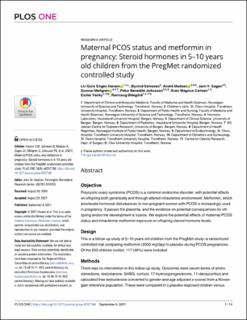Maternal PCOS status and metformin in pregnancy: Steroid hormones in 5–10 years old children from the PregMet randomized controlled study
Hanem, Liv Guro Engen; Salvesen, Øyvind; Madsen, Andre; Sagen, Jørn Vegard; Mellgren, Gunnar; Juliusson, Petur Benedikt; Carlsen, Sven Magnus; Vanky, Eszter; Ødegård, Rønnaug
Peer reviewed, Journal article
Published version

Åpne
Permanent lenke
https://hdl.handle.net/11250/2785975Utgivelsesdato
2021Metadata
Vis full innførselSamlinger
Sammendrag
Objective Polycystic ovary syndrome (PCOS) is a common endocrine disorder, with potential effects on offspring both genetically and through altered intrauterine environment. Metformin, which ameliorate hormonal disturbances in non-pregnant women with PCOS is increasingly used in pregnancy. It passes the placenta, and the evidence on potential consequences for offspring endocrine development is scarce. We explore the potential effects of maternal PCOS status and intrauterine metformin exposure on offspring steroid hormone levels. Design This is a follow-up study of 5–10 years old children from the PregMet-study–a randomized controlled trial comparing metformin (2000 mg/day) to placebo during PCOS pregnancies. Of the 255 children invited, 117 (46%) were included. Methods There was no intervention in this follow-up study. Outcomes were serum levels of androstenedione, testosterone, SHBG, cortisol, 17-hydroxyprogesterone, 11-deoxycortisol and calculated free testosterone converted to gender-and age adjusted z-scores from a Norwegian reference population. These were compared in i) placebo-exposed children versus children from the reference population (z-score zero) by the deviation in z-score by one-sample t-tests and ii) metformin versus placebo-exposed children by two-sample t-tests. Holm-Bonferroni adjustments were performed to account for multiple endpoints. Results Girls of mothers with PCOS (n = 30) had higher mean z-scores of androstenedione (0.73 (95% confidence interval (CI) 0.41 to 1.06), p<0.0001), testosterone (0.76 (0.51 to 1.00), p<0.0001), and free testosterone (0.99 (0.67 to 1.32), p<0.0001) than the reference population. Metformin-exposed boys (n = 31) tended to have higher 11-deoxycortisol z-score than placebo-exposed boys (n = 24) (mean difference 0.65 (95% CI 0.14–1.17), p = 0.014). Conclusion Maternal PCOS status was associated with elevated androgens in 5- to 10-year-old daughters, which might indicate earlier maturation and increased risk of developing PCOS. An impact of metformin in pregnancy on steroidogenesis in children born to mothers with PCOS cannot be excluded. Our findings need confirmation in studies that include participants that have entered puberty.
